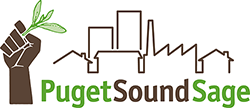Advancing community controlled, community inspired development.
Our equitable development program advances policies that support compact, high-density development and affordable housing along transit corridors to prevent displacement, which is core to healthy, climate-resilient communities.
Publications
Thriving In Place: Visions For Community Stewardship Across King County
The Multicultural Community Coalition and Puget Sound Sage come together to highlight three stories from three organizations across King County: Congolese Integration Network, the NW BIPOC Farmland Trust, and the Na’ah Ilahee Fund—to show the great need to support equitable development and root BIPOC communities in place across the county. Across King County, BIPOC communities are seeding equitable development projects in urban communities and rural communities. They are seeding housing, cultural, community centers, agricultural and conservation projects. With a well funded King County Equitable Development Initiative (EDI), their projects can bloom. Read more
The Power of Community Stewardship of Land
The Community Stewardship of Land website is a culmination of the past two years of co-learning, research, and visioning by the Community Real Estate Stewardship Training (CREST) network. The "learning circle" was designed to support and train grassroots organizations serving low-income communities and BIPOC communities pursuing community driven development, land stewardship, and strategies for long-term affordability.
Disaster Gentrification in King County and How to Stop it From Happening Again
Rainier Beach Action Coalition, the Multicultural Community Coalition and Puget Sound Sage came together to develop a shared analysis of the threats the COVID-19 pandemic may pose to the land and housing of our Black, Indigenous and People of Color communities. We refer to the primary threat as “disaster gentrification”, when people with wealth (investors and speculators) take advantage of a disaster to buy and/or take land and housing for cheap from lower-income people, and then sell or rent to higher-income people for a profit. Read more
The shortened webpage version of the report is available here.
More Places, Better Connections: Transit Priorities for Residents of South Seattle and South King County
Across our region, we are investing billions of dollars in public transit infrastructure over the next thirty years. At Puget Sound Sage, we have long supported building a public transportation system that connects low-wage workers, BIPOC communities, and people with disabilities to work, to healthcare, to childcare, to school, and to community, cultural, and faith centers. We believe public transit can create good jobs, reduce carbon emissions, and increase public health and well-being.
Graham Street: A Community Driven Neighborhood Vision
In 10 years, Sound Transit will build a new light rail station at Martin Luther King Way South and Graham Street. That station will connect our neighborhood to opportunities across the region – including jobs, schools, goods, and services. Along with the new station will come a hub of new business space, new homes, and new infrastructure. We imagine our community benefiting from this investment, by building on what we already have and what makes us strong.
Dramatic Growth of Short-Term Rentals in Seattle Could Reduce Apartment Supply
Growth in short-term rentals threatens to remove long-term units from the local housing market, impacting households struggling to find affordable housing and stay in Seattle.
Community-Supported Equitable Development in Southeast Seattle
Urban planning must address the needs for culturally competent services and growing concerns around public safety measures that harm, rather than benefit, a community.
Racial Equity: New Cornerstone of Transit-Oriented Development
Transit-oriented development planning and policy must go beyond mere inclusion of community members in the process and take a more proactive approach to ensure racial equity.
Transit Oriented Development that’s Healthy, Green & Just
New study from Puget Sound Sage provides evidence that gentrification underway in southeast Seattle is likely to cause the displacement of renters and low-income residents from Rainier Valley.









